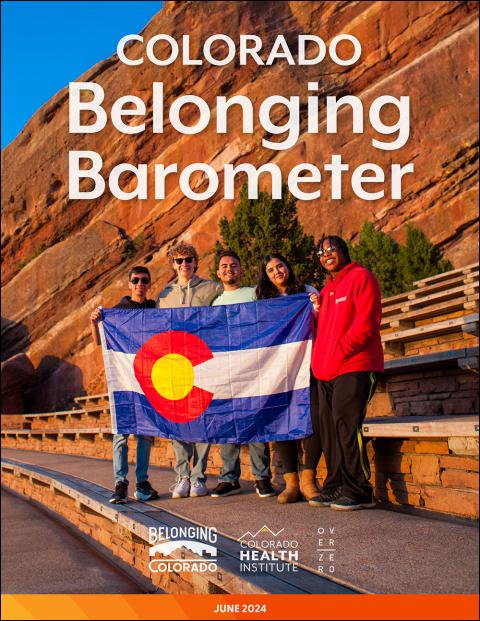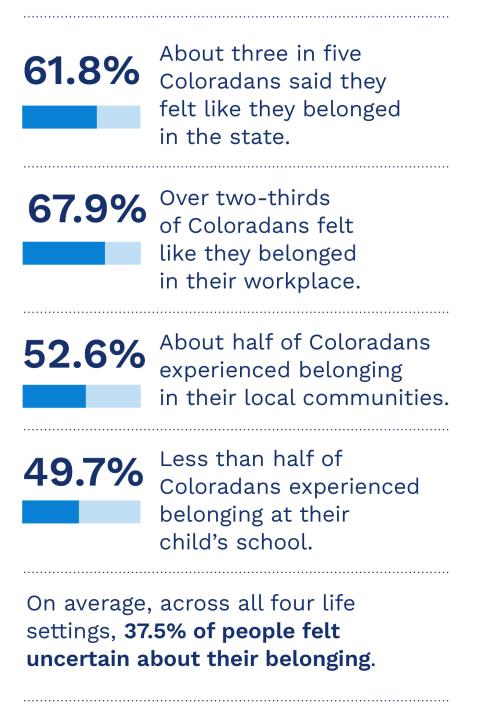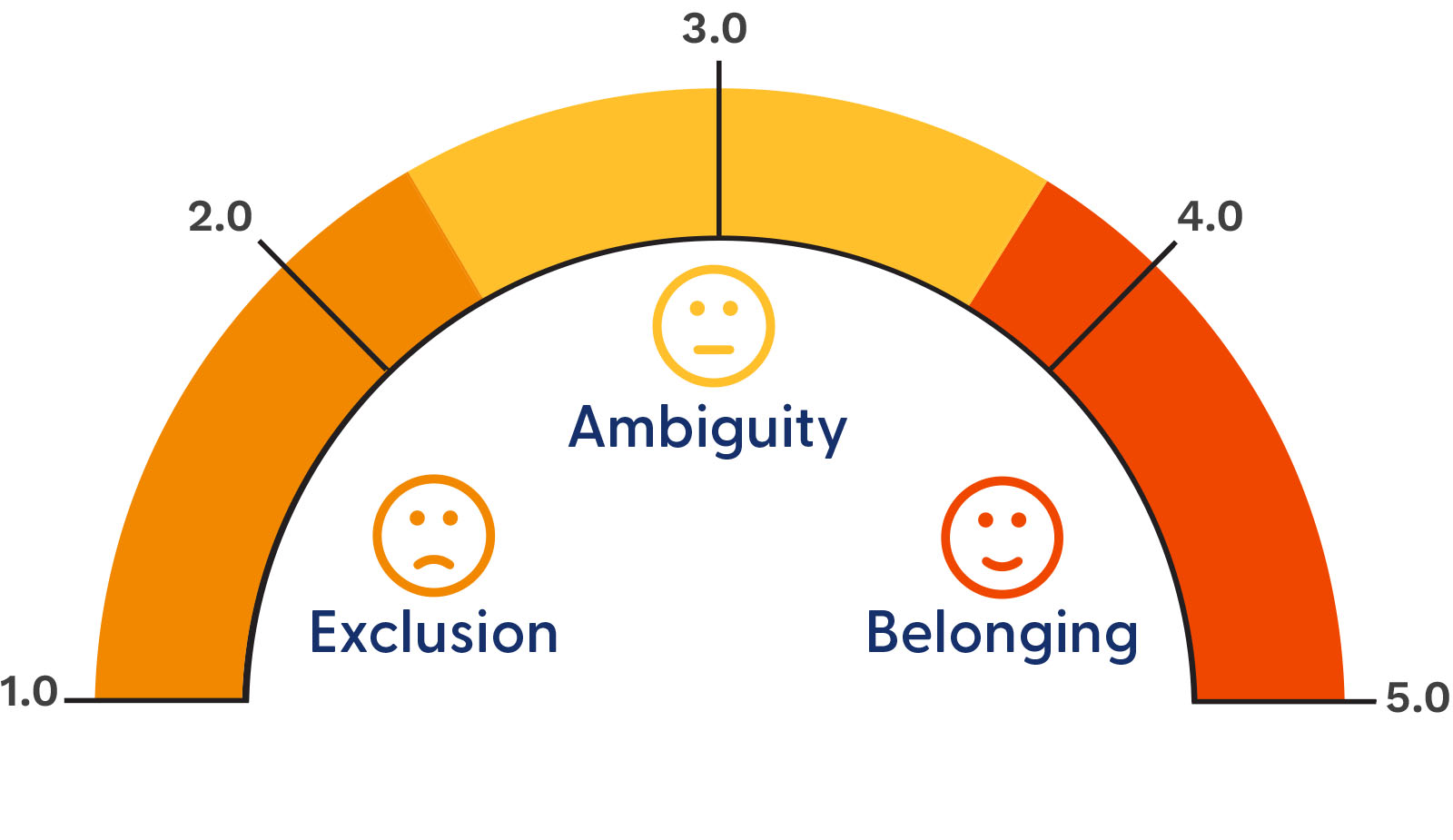
Executive Summary
A sense of belonging is important to people’s mental health, physical health, and place in society.
The implications of belonging are widespread. A lack of belonging can fray the fabric of society through increased loneliness, political polarization, and discrimination. Alternatively, a strong sense of belonging can tighten that fabric by increasing trust in one’s neighbors and community members, as well local institutions. But the concept of belonging — and how to foster it — is not widely understood.
The Belonging Barometer, originally developed by Over Zero and the American Immigration Council, is a set of 10 questions that aims to measure belonging by capturing its multifaceted nature, such as whether people feel they have a voice, are socially connected, and are welcomed and included. The Barometer can be adapted to different life settings — everyday contexts for which we want to understand belonging — for example, whether people feel they belong among their family and friends or in their workplaces.
To build on this national work and understand what belonging looks like for Coloradans, the Colorado Health Institute (CHI) partnered with Over Zero in 2023 to adapt and administer the Belonging Barometer. Over 1,100 people responded to the Colorado Belonging Barometer, which measured what belonging looks like in our state, local communities, workplaces, and schools. The Colorado survey also went beyond the national Barometer to uncover more about belonging, such as social connection and additional spaces or activities that may evoke a sense of belonging.
Learn more about Belonging Colorado and related grant opportunities on the Denver Foundation website
Key Findings
What does belonging look like in Colorado?
Survey findings reveal that a majority of people feel a sense of belonging in Colorado as well as in their workplaces. However, belonging in local communities and schools is less prevalent. While very few people felt excluded in any setting, a significant portion experienced uncertainty on whether they belong.
Increasing belonging across all settings is needed. A better understanding, specifically of the large portion of people who were ambivalent about belonging, as well as the factors that may lead to this uncertainty, is needed to create environments where everyone feels valued and accepted.
Are there differences among those who did or did not feel they belong?
Level of education, a person’s sense of loneliness, and how long someone has lived in the state are just three examples of factors found to be associated with belonging.
In general, factors related to experiences or that influence an individual’s behaviors and what they feel or believe — such as their sense of isolation, their perception of the importance of belonging, or their political ideology — more frequently influenced belonging than demographics like age, race/ethnicity, or geography. Among demographic factors, education and income most frequently influenced belonging.
These factors are nuanced and can show up differently across life settings. For example, level of education was found to be associated with belonging in local communities, workplaces, and at a child’s school but was not associated with belonging in the state. Further, in the workplace setting, Coloradans with the least and most education had the highest percentage of people experiencing belonging (82.1% for those with a high school education or less and 71.7% for those with a postgraduate education). This speaks to the different ways education might impact belonging. An individual’s education level is often used as a credential. People may feel a greater sense of belonging if they are around others with similar levels of education in a workplace, regardless of what that level of education is. Alternatively, higher levels of education can lead to job opportunities, higher income, or broadened social networks. This may influence people’s belonging as they feel more empowerment and agency in any setting.
Policymakers and leaders should carefully reflect on how these factors can influence belonging and how they can be harnessed to increase belonging.
What else can we uncover about belonging?
Coloradans connect with others organically in their neighborhoods, workplaces, and children’s schools. These are important avenues for increasing social connection and belonging.
Parks, libraries, and places of worship are the most common places that evoke a sense of belonging, according to Coloradans who took the survey. Policymakers, funders, and community leaders should consider how they can leverage these and other easily accessible places in the community to bridge social capital.
On the other hand, fewer respondents reported they felt they belonged when visiting online forums (36.4%), using public transit (54.2%), and taking classes for a degree or certification (61.7%). These settings represent opportunities for policymakers and community partners to intentionally cultivate a sense of belonging.

What does this mean for Colorado and Coloradans?
The 2024 Colorado Belonging Barometer is a first-of-its-kind report on belonging in Colorado and the first time the Barometer was administered at a state level. Insights from the survey can serve as a baseline for measuring and understanding belonging and a starting point for finding ways to advance it and the many nuanced factors that can influence it.
While more research is needed to better understand the complexity of belonging, everyone has a role to play in building belonging.
- Individuals can consider how they show up in different spaces, how they engage with others, and how they can increase their own understanding of belonging and what it means for others.
- Employers can assess their company culture and how they support employees in feeling valued and included.
- Community partners and policymakers can find ways to implement strategies, programs, and policies that foster belonging and promote inclusivity, equity, and connection, especially in settings such as schools or other public spaces.
- Researchers can uncover more about who may not feel they belong and how to engage community members in better understanding belonging.
- Funders can assess how they align opportunities with fostering belonging and social connectedness and ensure strategies reflect inclusivity and collaboration.
As loneliness and belonging are increasingly recognized as a public health issues, CHI worked with local public health agencies to include new questions on the 2025 Colorado Health Access Survey that offer insight into loneliness and belonging across the state. Review our findings.



